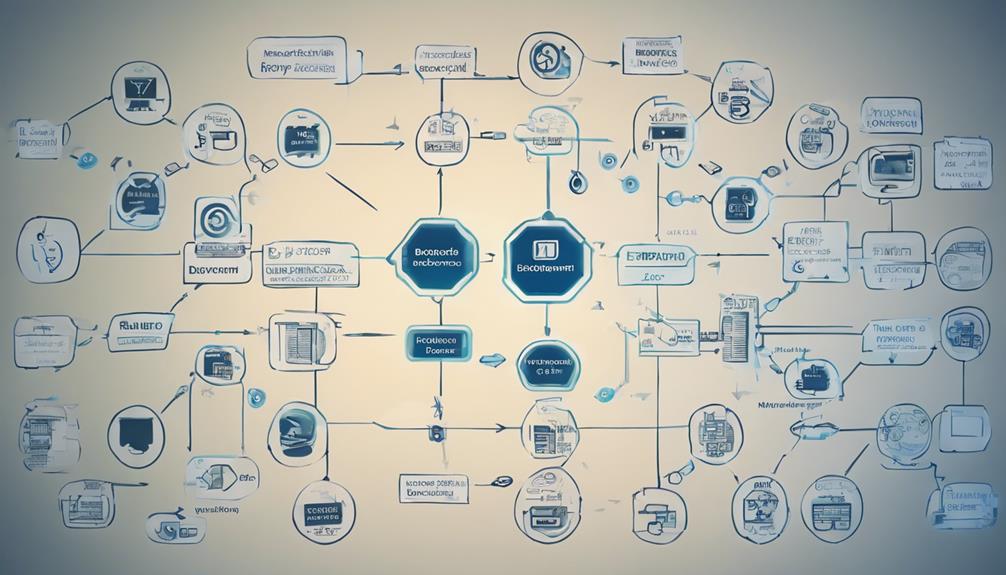Software Development in Afif
Definition and Types

Software development is a multifaceted process that entails the designing, creation, and maintenance of computer programs and applications tailored to specific requirements. Within this broad field, various types of software serve distinct purposes. System software, for instance, manages hardware and provides essential functionalities to support the operation of a computer system. On the other hand, application software is crafted for end-users to perform specific tasks or functions, such as word processing or graphic design.Additionally, programming software plays a significant role in assisting developers in writing, testing, and debugging code efficiently. This type of software provides tools and environments conducive to the creation of high-quality applications. Embedded software represents another category, involving specialized programs built into hardware devices to enable specific functionalities. Often found in devices like smartphones, household appliances, and automotive systems, embedded software enhances the performance and capabilities of these devices.Understanding the different types of software is fundamental to appreciating the diverse aspects of software development and its applications in various technological domains.
Jobs That Use Software Development in Afif
In today's technology-driven world, professionals in various industries rely on software development expertise to innovate and enhance their operations. Software developers play a critical role in creating, maintaining, and troubleshooting software applications across different sectors.System administrators are responsible for managing and maintaining operating systems and utility programs that are essential for system functionality. Software engineers utilize engineering principles and practices to design and develop software systems that meet specific requirements.Application software developers focus on designing, testing, and maintaining software tailored to business needs and user requirements. Additionally, programming software jobs involve writing, implementing, and testing code for various software applications and systems.These roles demonstrate the diverse applications of software development skills in the modern workforce, highlighting the importance of professionals well-versed in software development across multiple industries.Software Development Methodologies

Utilizing various frameworks and approaches, software development methodologies guide the systematic and efficient creation of software products. Popular methodologies include Agile, Waterfall, Scrum, and DevOps.Agile methodology prioritizes iterative development, customer collaboration, and adaptability to change. It focuses on delivering functional software in short cycles, incorporating feedback to enhance the final product continuously.Waterfall methodology, on the other hand, follows a sequential, linear approach. It progresses through defined phases such as requirements gathering, design, development, testing, and deployment in a structured manner. Each phase must be completed before the next one begins, emphasizing thorough planning upfront.Scrum, an Agile framework, emphasizes teamwork, accountability, and iterative progress in short sprints. It involves cross-functional teams working collaboratively to deliver increments of the product at the end of each sprint.DevOps combines development and operations to streamline collaboration, automate processes, and enhance efficiency throughout the software development lifecycle. By integrating these functions, DevOps aims to shorten development cycles and deliver high-quality software rapidly.
Key Steps in the Software Development Process
Initiating a software development project involves identifying the essential steps that form the foundation for a successful development process. These steps typically include need identification, requirement analysis, software design, coding, and testing and deployment.Need identification is a collaborative process with clients to thoroughly understand their software requirements. Requirement analysis is the initial step where requirements are carefully examined and documented to serve as a guide throughout the project.Software design plays an important role in creating a blueprint based on the analyzed requirements before the actual coding phase begins. Testing and deployment are important in ensuring that the developed software not only meets the specified requirements but also functions correctly before it is released to end-users.Why Is Software Development Important?

Certainly, software development stands as a cornerstone of modern technological advancements, driving innovation and revolutionizing industries worldwide. The importance of software development lies in its ability to create efficient, reliable, and user-friendly applications that cater to the ever-growing demands of the digital era. By enhancing productivity, fostering innovation, and boosting competitiveness across various sectors, software development plays a vital role in shaping modern products, services, and business operations.Moreover, the continuous evolution of software development processes is instrumental in propelling technological advancements and facilitating digital transformation on a global scale. Effective software development practices guarantee the delivery of high-quality, secure, and scalable solutions tailored to diverse needs, thereby enabling organizations to adapt to changing market dynamics and stay ahead of the competition.Fundamentally, software development is not just a technical process but a strategic enabler that drives progress and propels businesses towards success in the digital age.
Key Features of Effective Software Development in Afif
An essential aspect of effective software development lies in implementing agile methodologies to foster iterative progress and enhance adaptability in the development process. Agile methodology promotes continuous collaboration between cross-functional teams, allowing for faster value delivery and the ability to respond to changing requirements efficiently. DevOps practices further enhance this collaboration by integrating development and IT operations teams, leading to improved communication and automation throughout the software development lifecycle. Continuous Integration/Continuous Deployment (CI/CD) plays a critical role in automating code integration, testing, and deployment processes, ensuring that changes are implemented swiftly and reliably.Additionally, the adoption of a microservices architecture enables the development of decentralized, independently deployable services. This approach enhances scalability and flexibility, as each service can be developed, deployed, and scaled independently, without affecting the entire system. Effective software development empowers teams to be responsive to change while maintaining a high level of quality and efficiency, ultimately leading to successful and innovative software solutions.Waterfall Versus Iterative Development Misconceptions

Contrary to popular belief, misconceptions surrounding the comparison between Waterfall and Iterative development methodologies persist in the software development industry. Waterfall development follows a linear, sequential approach with distinct phases such as requirements gathering, design, implementation, testing, and deployment. In contrast, Iterative development involves repetitive cycles of development, allowing for feedback and adjustments throughout the process.One common misconception is that Waterfall is too rigid and lacks flexibility, while Iterative development is often perceived as chaotic and lacking structure. In reality, Waterfall is best suited for projects with well-defined requirements upfront, while Iterative development shines in projects with evolving or unclear requirements. Waterfall may lead to delayed feedback and potential rework due to its linear nature, whereas Iterative development promotes continuous improvement and collaboration.Understanding the strengths and weaknesses of each methodology can help teams choose the most suitable approach for their specific project needs, dispelling these misconceptions in the process.
Waterfall or Agile? Differences Between Predictive and Adaptive Software Methodologies
In software development, the choice between Waterfall and Agile methodologies hinges on the fundamental disparity between predictive and adaptive approaches. Waterfall follows a sequential process with distinct phases such as requirements gathering, design, implementation, testing, and maintenance. In contrast, Agile methodology emphasizes flexibility by breaking down projects into smaller, manageable iterations known as sprints. Waterfall is considered predictive as it requires thorough upfront planning based on fixed requirements, while Agile is adaptive, allowing for changes throughout the development cycle based on feedback received during regular collaboration with stakeholders.Waterfall is typically favored for projects with clearly defined and stable requirements, where a rigid plan can be followed effectively. On the other hand, Agile is more suitable for dynamic projects where requirements are expected to evolve over time. Agile's iterative nature and focus on customer involvement make it well-suited for environments that demand flexibility and quick adaptation to changing needs.Jobs That Use Software Development

Professionals in various industries rely on individuals skilled in software development to create, maintain, and troubleshoot essential software applications. System administrators play a critical role in managing operating systems and utility programs to guarantee the smooth operation of software.Software engineers, on the other hand, apply engineering principles to design and develop complex software systems that meet specific requirements. Application software developers focus on creating user-friendly software tailored to meet the unique needs of businesses, enhancing productivity and efficiency.Additionally, programming software jobs encompass a wide range of roles, from entry-level positions involving basic coding tasks to advanced positions requiring in-depth software development expertise. These professionals work across sectors such as healthcare, finance, education, and more, demonstrating the versatility and importance of software development skills in today's technology-driven world.Whether developing mobile applications, designing web platforms, or optimizing existing software, software developers are integral to the success of modern businesses.
System Software in Afif
Software development professionals proficient in creating user-friendly applications for various industries rely heavily on system software, which serves as the foundation for executing application software and managing hardware components. System software is specifically designed to provide a platform for running application software and controlling hardware components within a computer system. This category of software includes well-known operating systems such as Windows, macOS, and Linux, along with utility programs that aid in managing computer resources efficiently.One of the primary functions of system software is to manage computer hardware, memory, file systems, and other essential operations important for overall system performance. By handling these critical tasks, system software plays a pivotal role in ensuring the smooth functioning and interaction of various software and hardware components. Without the presence of system software, computers and devices would be unable to perform essential tasks or run application software effectively. Therefore, software developers must have a solid understanding of system software to create robust and reliable applications that can operate seamlessly within the computing environment.Programming Software in Afif

Programming tools such as integrated development environments (IDEs) are vital for software developers to efficiently write, edit, and compile code for creating various digital solutions. These tools offer features like syntax highlighting, code completion, and debugging capabilities to streamline the coding process and help developers write efficient code.Popular programming software options include Visual Studio, Eclipse, IntelliJ IDEA, and Sublime Text, catering to different programming languages and providing a range of functionalities. Programmers utilize programming software to develop software applications, websites, mobile apps, and other digital solutions, making it a cornerstone in the software development process.Mastering the use of programming software is essential for individuals aspiring to excel in the software development industry, as it enhances productivity, code quality, and overall efficiency in creating innovative digital products.
Application Software in Afif
When considering the domain of digital tools utilized in software development, a pivotal focus shifts towards Application Software, specifically tailored to address distinct tasks or functions within various industries and domains.Application software is designed with specific purposes in mind, such as word processing, email management, or graphic design. It is created to meet the needs of end users and is often customizable to suit individual preferences, enhancing user experience and productivity. Examples of widely used application software include Microsoft Office for office productivity tasks, Adobe Photoshop for graphic design, and Google Chrome for web browsing.One of the key features of application software is its graphical user interface (GUI), which provides an interactive and user-friendly experience for individuals. Setting it apart from system software, application software is intended for end users to accomplish specific tasks or goals efficiently and effectively.Programmers or Coders

Programmers, also known as coders, are fundamental contributors to the creation and development of software applications. They are skilled professionals responsible for writing and modifying code to bring software designs to life. Working closely with software developers and engineers, programmers play a vital role in translating design requirements into functional code that powers various software solutions. Using programming languages like Python, Java, C++, and JavaScript, programmers focus on the technical implementation of software features and functionalities, making sure that they align with project specifications.Their expertise lies in turning algorithms and logic into working programs, which are essential components of the software development process. By meticulously coding and testing software, programmers make sure that applications are robust, efficient, and user-friendly. Their ability to understand complex algorithms and problem-solving skills enables them to create innovative solutions that meet the needs of users and businesses alike.
Software Engineers in Afif
Software engineers are instrumental in designing, developing, and maintaining software systems tailored to specific user requirements, utilizing programming languages such as Java, Python, and C++ alongside specialized tools like IDEs. They play an important role in the software development process by working closely with clients, stakeholders, and team members to make sure that projects meet their objectives.Software engineers are responsible for analyzing user needs, troubleshooting technical issues, and implementing efficient solutions throughout the software development lifecycle. Their expertise is essential from the initial design phase to deployment and ongoing maintenance of software applications. By leveraging their programming skills and utilizing various tools, software engineers contribute to the creation of functional and user-friendly software solutions.Their ability to adapt to evolving technologies and their problem-solving skills make them essential members of any software development team.Frequently Asked Questions
What Does a Software Developer Do?
In their role, professionals analyze requirements, design solutions, implement strategies, and maintain systems to meet objectives. Collaboration with stakeholders, adherence to best practices, and continuous skill development are vital for delivering effective solutions in a dynamic environment.What Do You Mean by Software Development?
Software development refers to the systematic process of creating, testing, and maintaining computer programs and applications to meet specific requirements. It involves stages like analysis, design, implementation, testing, deployment, and ongoing support to guarantee functionality and performance.How Difficult Is Software Development?
Solving the challenges of mastering a complex skill like software development requires problem-solving prowess, attention to detail, and a commitment to continuous learning. The difficulty level can vary based on project scope, requirements, technology stack, and team dynamics.What Are the 5 Steps of Software Development?
The 5 steps of a structured development process typically include requirement analysis, design, implementation, testing, and deployment. Requirement analysis involves understanding project needs, design focuses on architecture, implementation translates design into code, testing identifies errors, and deployment launches the software.Afif Software Development: Innovating Solutions for Today’s Businesses
Afif Software Development is a leading provider of innovative software solutions for businesses across various industries. With a strong focus on cutting-edge technology and user-centric design, Afif Software Development has established itself as a trusted partner for companies looking to optimize their operations and stay ahead in today’s fast-paced marketplace.
Delivering Customized Solutions
One of the key strengths of Afif Software Development is its ability to deliver customized solutions that cater to the specific needs and challenges of each client. By working closely with businesses to understand their unique requirements, the team at Afif Software Development develops tailored software solutions that streamline processes, enhance productivity, and drive business growth.
Embracing Emerging Technologies
In an era of digital transformation, Afif Software Development stays at the forefront by embracing emerging technologies such as artificial intelligence, machine learning, and cloud computing. This proactive approach allows the company to provide its clients with cutting-edge solutions that are scalable, secure, and future-ready.
Empowering Businesses with User-Centric Design
At Afif Software Development, user experience is at the heart of every solution. The company’s team of designers and developers work collaboratively to create intuitive and visually appealing interfaces that ensure a seamless experience for end-users. This focus on user-centric design sets Afif Software Development apart in an industry where usability and accessibility are increasingly important factors.
Conclusion
In conclusion, Afif Software Development stands out as a provider of innovative and customized software solutions that empower businesses to thrive in today’s competitive landscape. With a commitment to excellence, a focus on emerging technologies, and a dedication to user-centric design, Afif Software Development continues to drive value for its clients and make a positive impact in the world of software development.
Other Services in Afif
Afif (Arabic: عفيف ʿAfīf) is a city in central Saudi Arabia, in the Najd region. It is situated approximately halfway between Riyadh and Mecca. The modern town was established in the 1910s as a hijra, or “settlement”, for the nomadic tribes of the area, particularly the tribe of ‘Utaybah (see Ikhwan). It has since grown into a small city of 39,581 as of the 2004 census, not counting the surrounding towns and villages, which together with ‘Afif form the ‘Afif Governorate.
The city once served as a gateway between the central and western regions of Saudi Arabia. The city is also known to be the first landing site of the first airplane owned by King Abdulaziz the first king of Saudi Arabia.
The town was named after an old well in the area called Afif “بئر عفيف – البير العود”. People used to pass by this well in their way to Mekkah while performing the Hajj or Omrah, in order to get water for the rest of the way. Eventually, during the month of Hajj, merchants began to congregate around this well to sell their goods to the pilgrims, which led to the first settlements being established. Thereafter, the people from small villages nearby the well started to recognise how profitable it was to live nearby this well, and houses started to be built there, which caused the city to develop over time.
